Making repairs to your vehicle is critical for keeping it in good shape. Have you recently used a degreaser on your car's engine and can't stand the smell? Why does the engine degreaser have such a potent scent? What is the best way to get rid of this aroma?
We will answer these questions throughout this post and many others. Let's begin!
For those dealing with the smell of engine degreaser, you want to let your vehicle air out for a bit immediately afterward. Ideally, you will position a fan towards your car or on the inside and let this push the degreaser's scent outside.
Additionally, you can try putting a scented plug-in or hang one from your rearview mirror to mask the degreaser smell until it wears off in a few days.
Luckily, this product should stop smelling bad after a few days, but in the meantime, you might need to get creative.
As we start, we will cover all things engine degreaser and discuss how to get it out of your car. Whether you had a professional do this or you did, it's always essential to keep your vehicle smelling good and running efficiently. With that said, let's dive right into this article below!
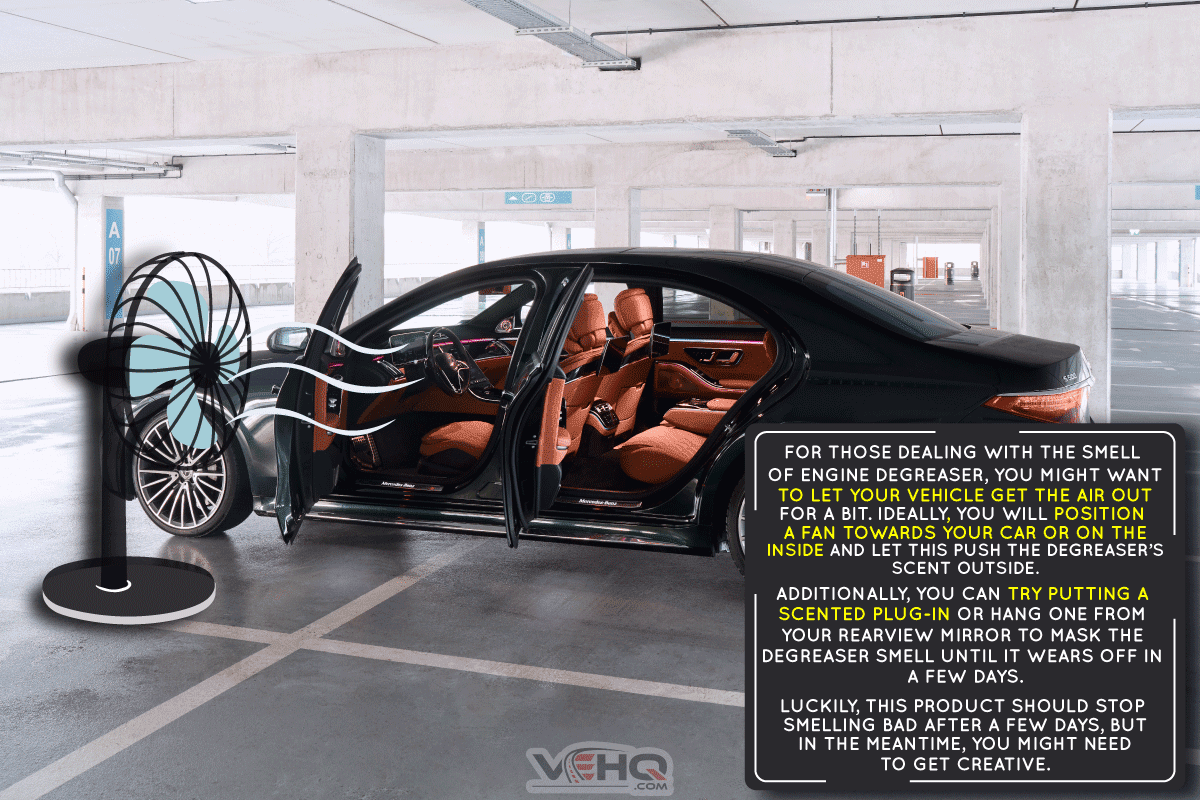
Why Does The Inside Of My Car Smell Like Engine Degreaser?
One of the main reasons you can smell engine degreaser inside your car is because someone didn't dilute it enough. Considering this product is potent, it's normal to be bothered by its scent.
Generally, if you or whoever applied the degrease spilled it onto other sections of the engine's exterior, it's expected for an odor to happen.
If this happens, we recommend rinsing off the affected spot and using a fan (or many) to blow the leftover smell away and out of your vehicle.
You might also want to use an air freshener or cleaning product inside your car if the smell makes its way in, as this will help alleviate things until the degreaser's impact lessens.
Again, most, if not all, car products have a strong odor. Unfortunately, a degreaser is one of the more nauseating, so this is a common issue for many drivers.
It's also worth mentioning that most degreasers will wear off within a few days on their own, so this won't be a persisting issue.
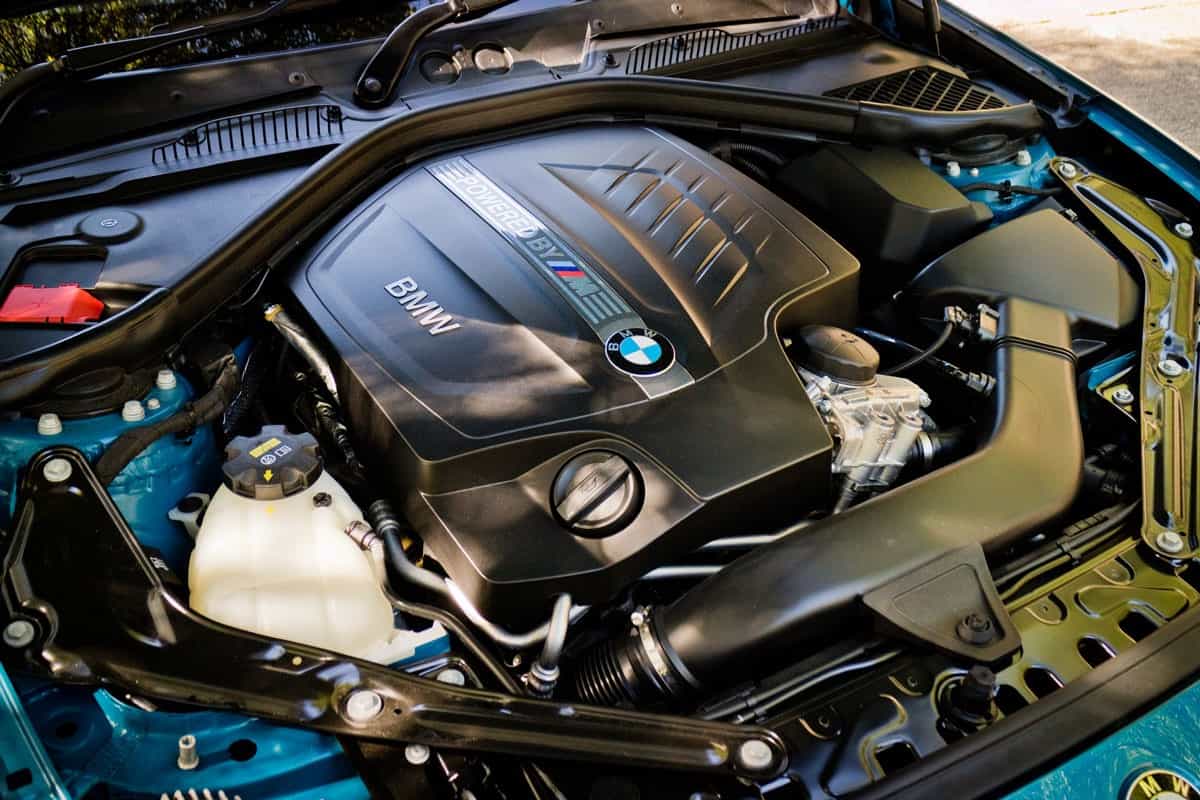
Why Does Engine Degreaser Smell So Bad?
For anyone wondering what happened, you're not alone in thinking their engine degreaser smells awful. Part of the blame for this potency is the different percentages of ingredients in most degreasing products.
For example, it's common to see anywhere from 20% to 80% kerosine in engine degreaser, as well as fuel oil and heavy naphtha. These ingredients have powerful smells and can make up most of a degreasing agent.
Furthermore, your degreaser will have between 2% to 15% surfactant, 5% to 15% 1, 1, 1 trichloroethane, and 5% to 15% butyl cellosolve.
Of course, most of us read those ingredients and don't know what they mean. Like most car-related products, your degreaser is full of chemicals and other potentially harmful components.
Therefore, the foul smell makes sense, as the product isn't supposed to come in contact with humans.
However, some degreasers may have around 10% of a scented ingredient, although it likely won't help hide the other aromas throughout your engine.
Every degreaser will be a little different, but all of them will smell strong.
What Is The Best Way To Get Rid Of A Degreaser Smell?
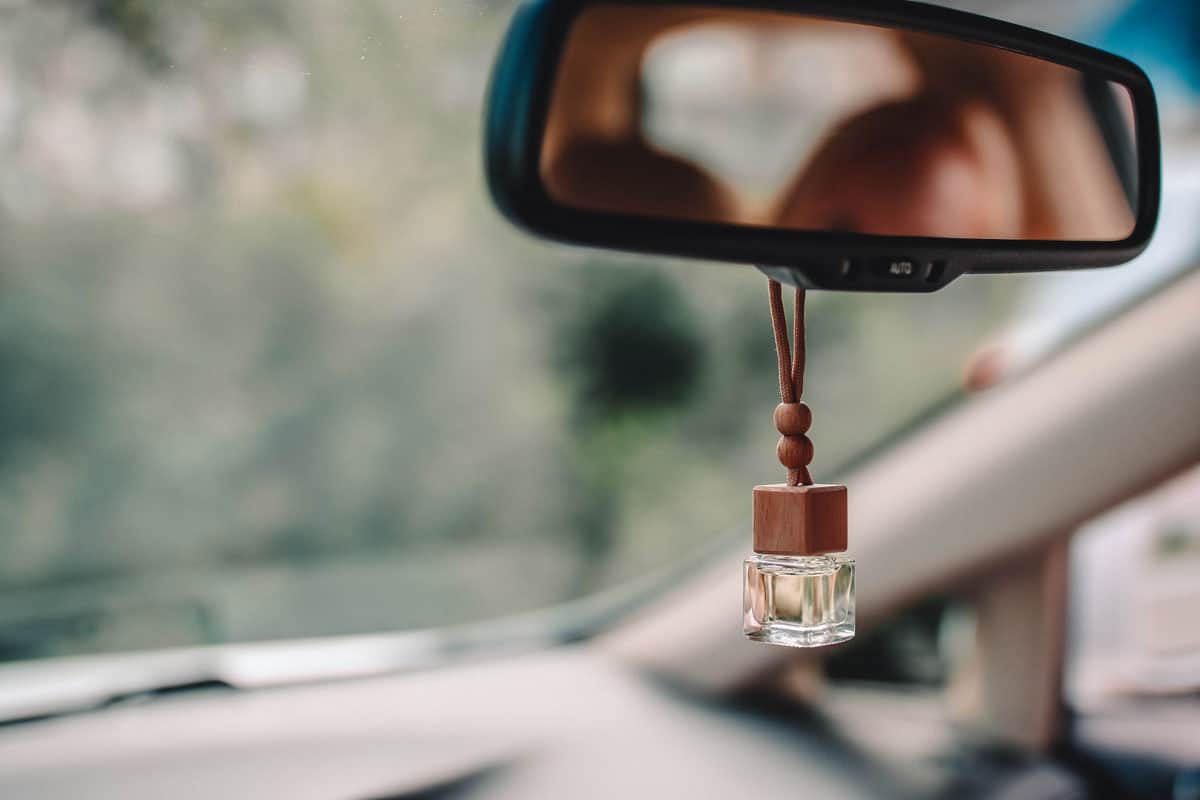
One of the best ways to eliminate engine degreaser smells in your car is by opening the windows and turning on a few fans. You can plug in a couple of high-power fans nearby or drive around with your windows rolled down.
Furthermore, many people use plug-in fragrances to get rid of/mask the smell of degreasers, specifically citrus-based ones. Usually, citrus car scents are the strongest, so if you don't mind that, it's something to try.
As we covered above, the engine degreaser should wear off in a few days. However, if you or the technician spilled a degreaser on the outside of your engine or car, you will need to clean it.
We recommend using water and even baking soda for interior spills. You can also use baking soda to absorb odors in a tight space by placing an opened container inside for a few hours.
According to Car And Driver, you want to rinse off any degreaser outside the engine, avoiding the direct components of the engine to avoid damaging them.
They also mention using compressed air to "blast" through any crevices in your engine to remove moisture/product, so there are many ways to do this.
Does Engine Degreaser Leave Residue?
Yes, it is possible for certain degreaser products to leave a residue on your vehicle. Generally, you want to rinse off any engine degreaser you spill on/around your car, protecting it from long-term damage.
Specifically, an engine degreaser can leave marks and cause the paint to fade away on your vehicle.
In addition, some heavy-duty degreasing products have a habit of causing car paint to peel altogether, which can be an expensive mistake.
So, if you notice any spillage, try to grab a hose and soap as soon as possible. The last thing you want is to destroy the paint on your vehicle without even realizing it.
Moreover, it might be better to drive through a car wash after adding a degreaser to be safe.
Is Engine Degreaser Toxic?
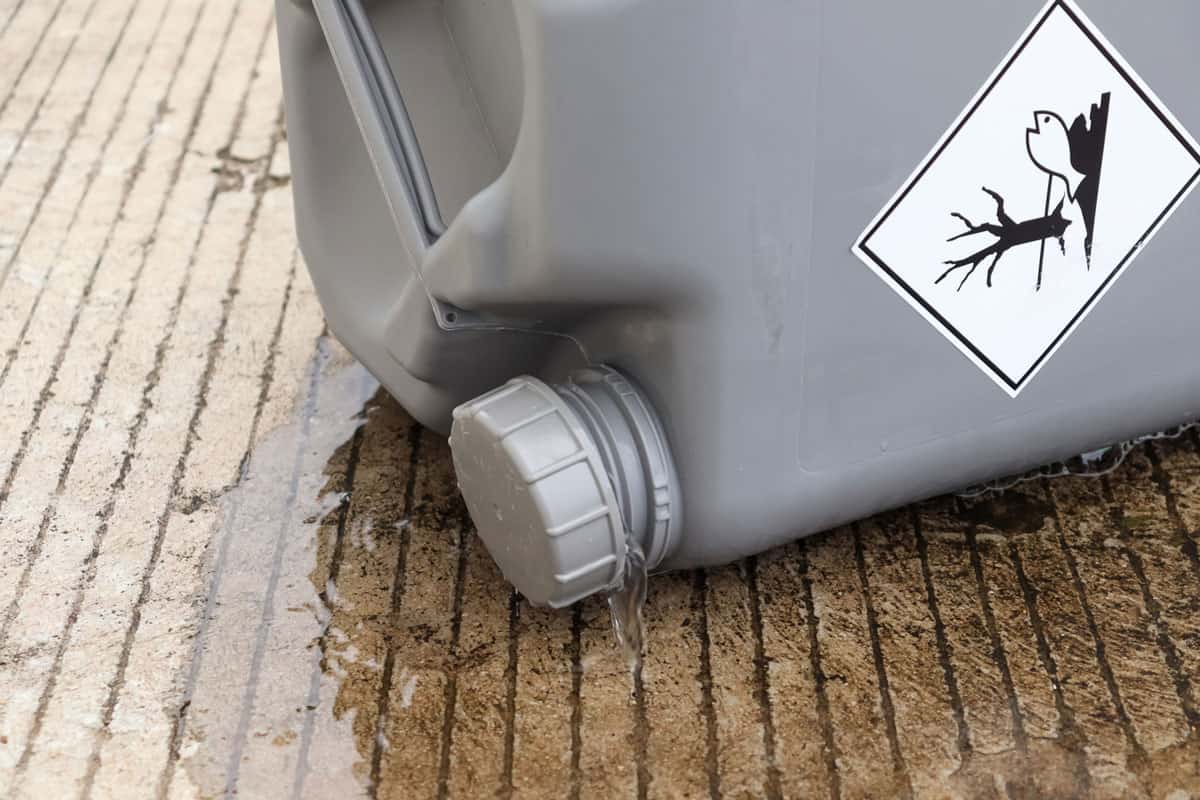
Yes, it is common for engine degreasing products to contain toxic and harmful chemicals. One of the first things you want to determine is whether your degreaser is water-based or oil-based.
Although this may not seem a big deal, water-based degreasers tend to be less toxic than their oil-based counterparts. Generally, oil-based engine degreasers are highly toxic and flammable, making them a bit risker to use.
In addition, oil-based degreasing agents should never come in contact with other surfaces besides your engine. From an environmental standpoint, oil-based degreaser can become a major pollutant to natural water and ground nearby.
Therefore, it's critical for you only to use enough to handle your engine and to never pour any into the ground or water.
As we mentioned earlier, higher potency degreasing products can also wreak havoc on a vehicle's paint, so overall, we recommend sticking to water-based alternatives.
To list some potentially hazardous ingredients, it's common for degreasers to include:
- N-Propyl Bromide (nPB)
- Trichloroethylene (TCE)
- Perchloroethylene (Perc)
All American Car Care Water Based Degreaser
This degreaser has a water-based formula, only requires a single application, is heavy-duty, is 12-1 concentrate, is biodegradable, and comes in a one-gallon container.
Follow this link to view it on Amazon.
Is It Safe To Use Engine Degreaser Yourself?
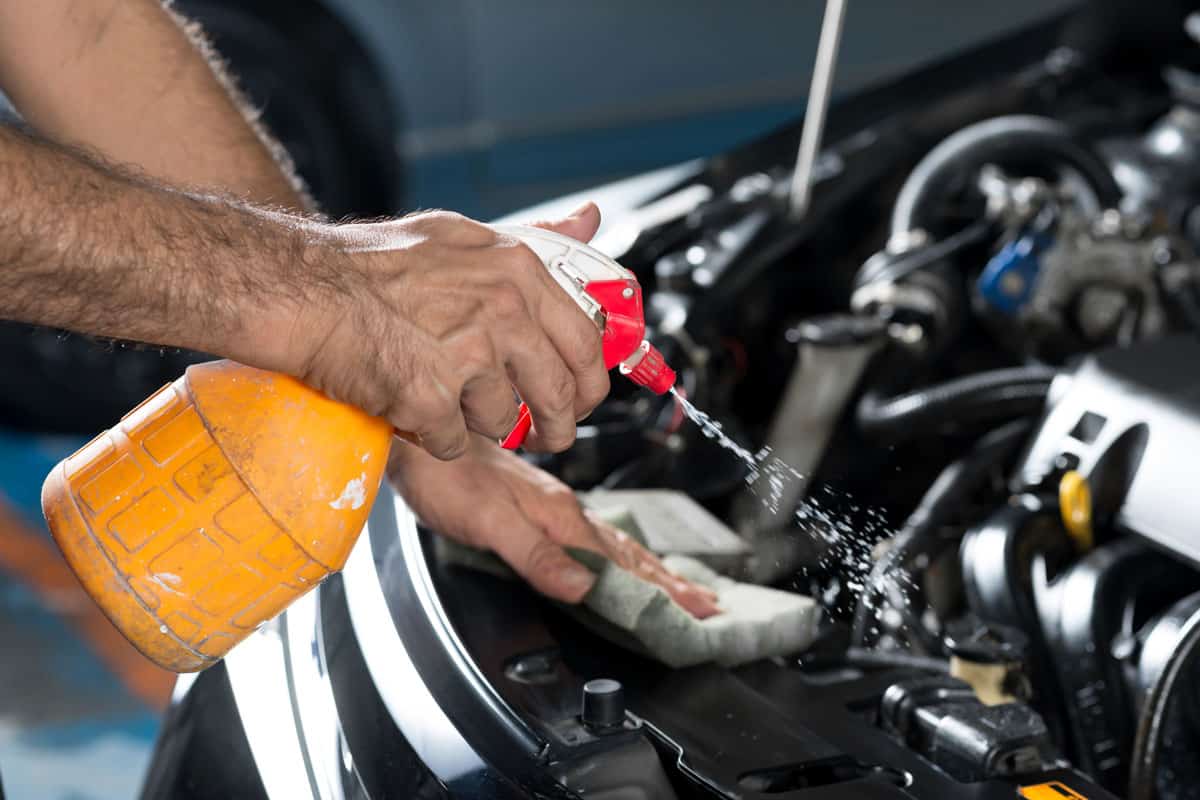
Unless you have extensive knowledge of cars, we don't recommend using a degreaser yourself. Considering that this product tends to have harsh chemicals, you can put yourself in danger by misusing it.
Moreover, cleaning out an engine isn't always as easy as it sounds, so the more experience you have, the better. Regardless, you want to protect yourself during the engine cleaning process.
Try to wear elbow-length gloves and even a pair of glasses or goggles to protect your eyes from chemical splashing. The more covered your skin, the safer this will be for you.
You also want to let your degreaser sit in the engine for 10-15 minutes. During this time, check the exterior of your car for any spills and clean them with soap and water.
As we said, degreaser (especially oil-based) can eat away at vehicle paint, so this is imperative.
How Often Do You Need To Add Degreaser To A Car Engine?
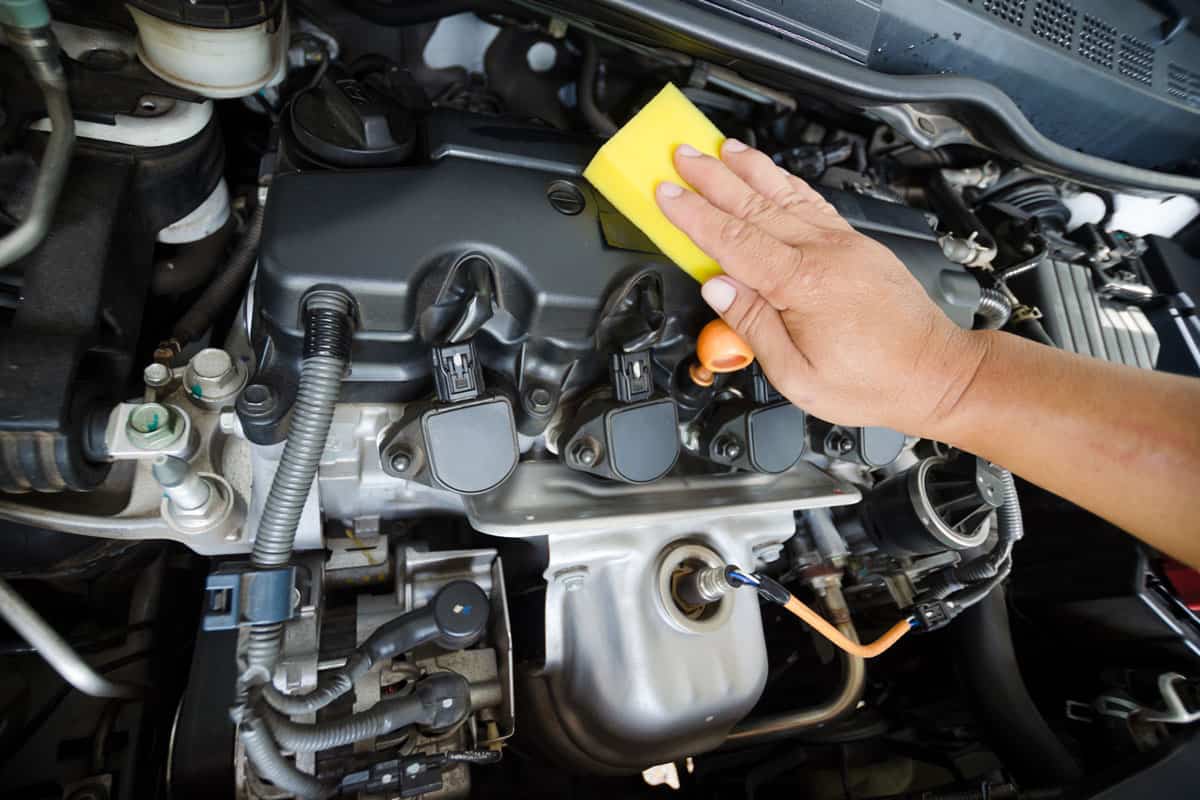
In general, you should clean out your car's engine every 6,000-10,000 miles. This includes applying a degreasing agent to the engine, letting it sit for 10-15 minutes, and refilling your tank.
You will typically do this at the same time as an oil change, hence why so many car owners don't even realize it's required.
With that said, some people don't always find using degreaser necessary. Especially if you drive your vehicle properly and keep it well-maintained, there won't likely be enough build-up to cause a problem.
Since your car's engine requires oil to operate, it's entirely normal for the build-up to occur. One of the benefits of taking your vehicle to a shop is that an expert can check this for you, which tends to be safer.
Again, you don't need to use a degreasing agent often, so this is not something to worry about frequently.
Do I Have To Clean My Vehicle's Engine?

Yes, it is vital to clean the engine bay of your vehicle regularly. Usually, cleaning a car's engine routinely is an easy way to spot issues before they become a major problem.
You also want to clean your car's engine every 10,000 or so miles to ensure there isn't too much oil build-up. Again, this doesn't need to be an intense cleaning, but you or a professional should inspect the engine in detail.
Many experts recommend cleaning the exterior of your engine to prevent rust and other structural damage/wear, so this is a step you want to remember.
To Wrap Up

Whether you have a new or older car, you must keep up with the engine. We found that degreaser can become a significant issue scent-wise for drivers.
To remedy the strong smell, you can air your car using fans or drive around with the windows down. Furthermore, it could be better to use citrus-scented plug-ins or hanging sticks inside your vehicle.
The stronger smell will overpower the chemical scent from the degreaser until it wears off in a few days.
Made it to the end? Check out these helpful related vehicle posts below!
How Many Miles Can A Diesel Engine Last?
Can A Clogged Oil Filter Make Your Engine Knock?
Engine Squealing But It's Not The Belt - What Else Could Be Wrong?

